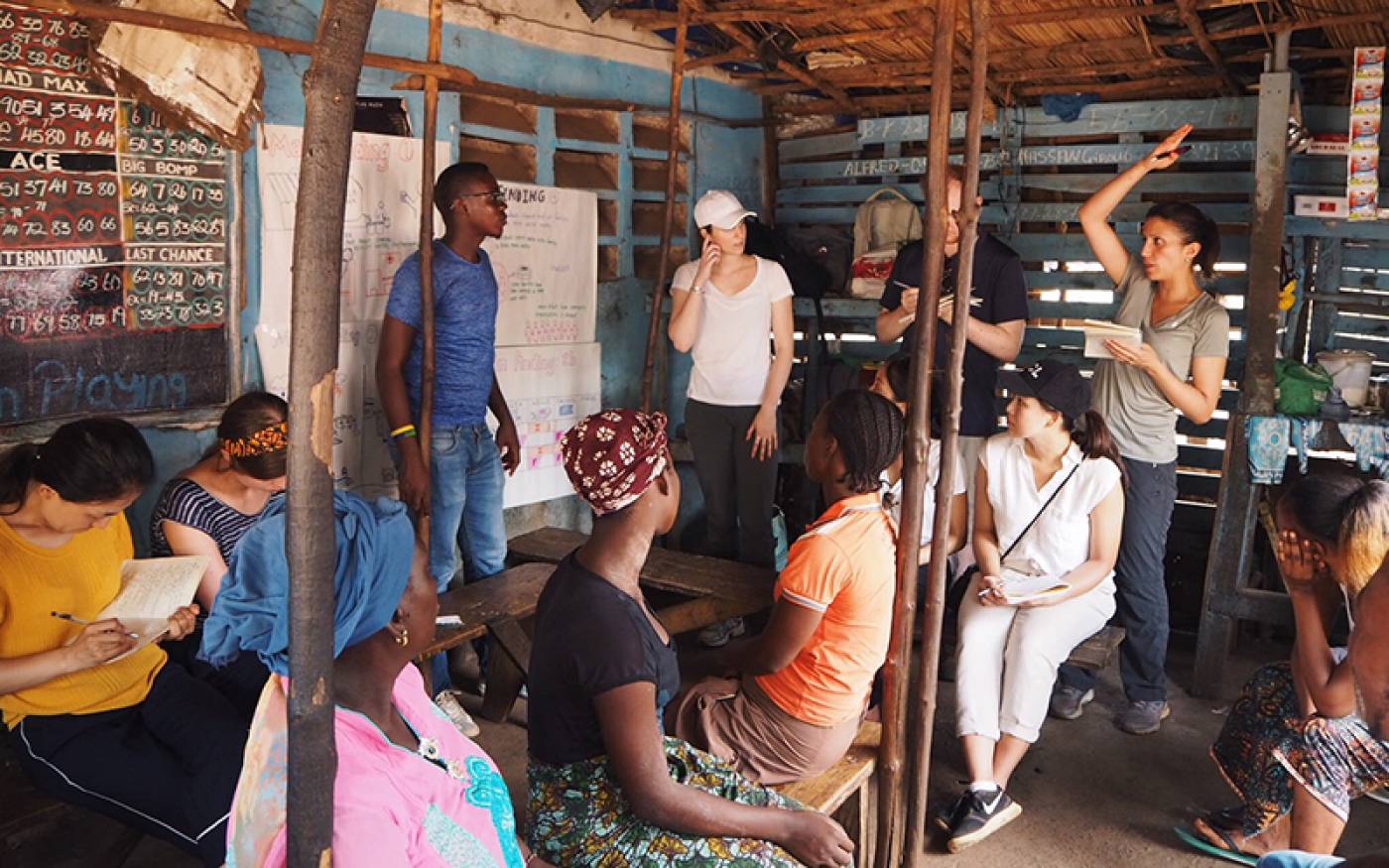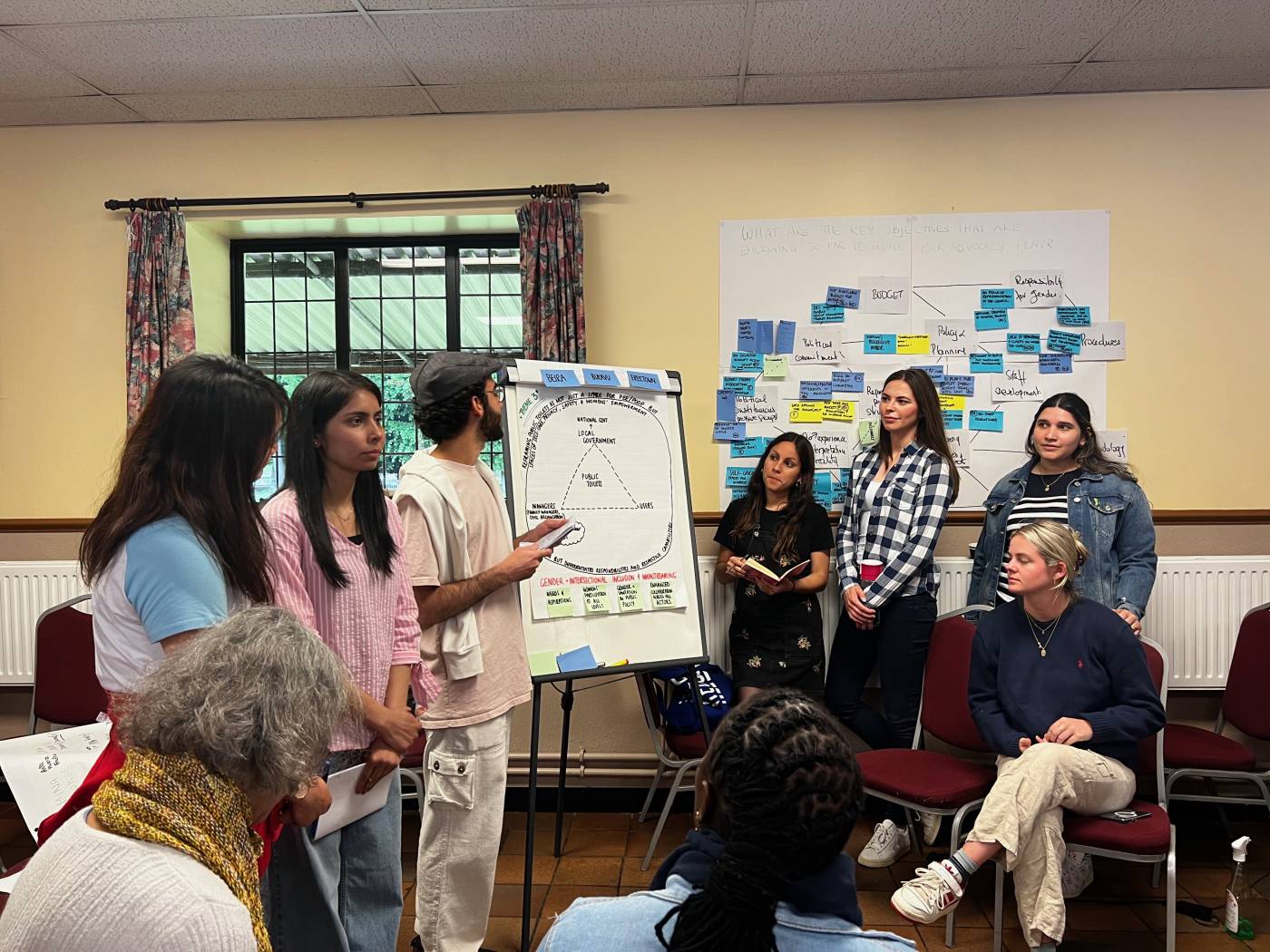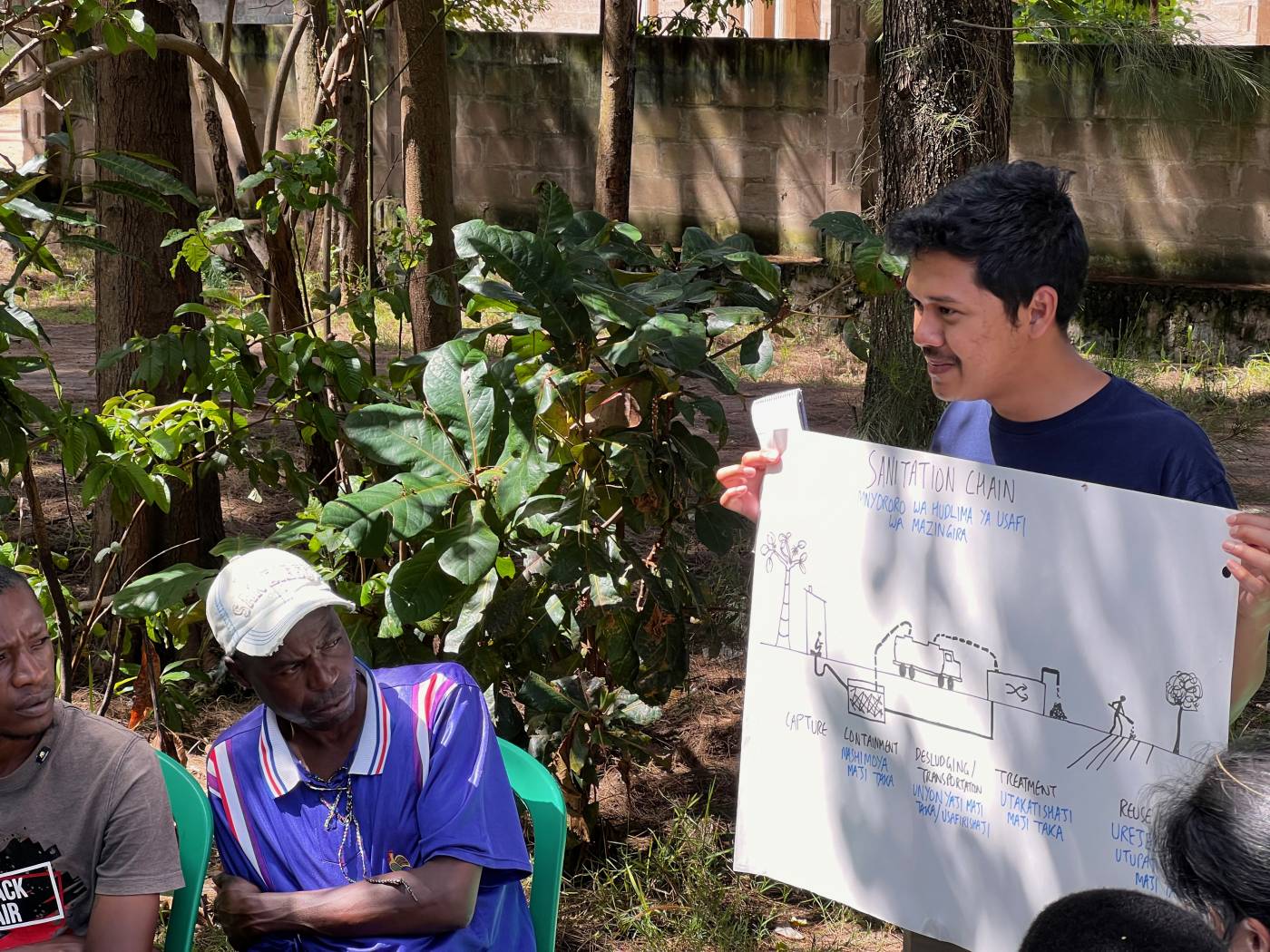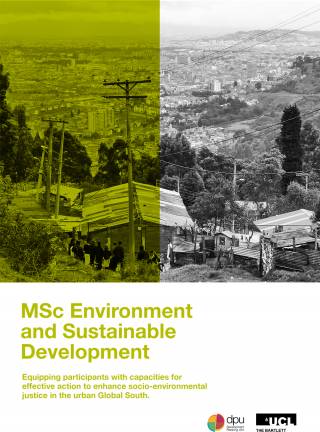The Environment and Sustainable Development MSc develops impactful professionals with the clarity and agency to enhance equitable and sustainable futures in the face of climate change.



About the course
At a time when planet earth is facing a crisis of the future, with unprecedented environmental degradation, displacement, disasters and the reproduction of inequalities, the Environment and Sustainable Development MSc equips participants with the knowledge, capacities and skills to carve pathways for long-term sustainability.
Our course is uniquely defined by our efforts to bridge theory and practice to address the world’s most pressing socio-environmental challenges in the context of climate change and uncertainty. By focusing on urban settings of the Global South and wider linkages, we take an interdisciplinary approach, integrating feminist political ecology, environmental justice and systems thinking.
In addition to grounding theory in current debates, as an Environment and Sustainable Development MSc student you will also be exposed to real life situations through an overseas practice engagement. This is the practical component of our course where you will acquire direct experience in knowledge co-production by taking part in action-learning alliances established with our long-term partners and various communities working towards transformative change. You will be guided by our academic staff at the forefront of research, practice and consultancy, participants, and be exposed to cutting-edge thinking and approaches for how to address environmental challenges through various entry points such as nature-based solutions, climate change adaptation and resilience, sustainable infrastructure and services, food and agriculture, environmental governance and management and a thorough understanding of urban and peri-urban linkages.
Our overseas practice engagement will also develop your capacity to publish a range of outputs (such as policy briefs, reports and audio-visual materials) that operate beyond academia and can serve partner organisations, at the same time as building the portfolio for your future career. Ultimately, the Environment and Sustainable Development MSc provides opportunities for participants to interact with leading thinkers in environmental development planning and to join an international community of practice committed to justice and sustainability.
By the end of your studies on the Environment and Sustainable Deveolopment MSc, you will be able to:
- Identify the critical relations between development planning and environmental challenges across time and space in a rapidly urbanising Global South;
- Advance a progressive environmental agenda through an understanding of the processes that generate environmental degradation and inequality, focussing on fundamental concepts such as climate colonialism and environmental justice.
- Identify strategic pathways for addressing environmental injustices and enhance collective capacities to act;
- Build a community of practice with a shared mission and vision for environmental justice through long term partnerships with fellow participants, alumni, instructors and international partners;
- Develop as reflexive and ethical professionals with enhanced capacities as critical thinkers, team players, motivated individuals, effective managers and impactful communicators.
On this page
- Who should apply
- Course structure
- Environment and Sustainable Development in Practice
- Careers and employability
- Staff
- More information
Who should apply?
One of the great strengths of the Environment and Sustainable Development MSc is the international diversity of our cohorts of students who come from multiple disciplines.
Each year we welcome anthropologists, economists, geographers, scientists, architects, planners and engineers from around the world who enrich our course with their varied knowledge and experiences. If you wish to become a change-maker, apply to study on the Environment and Sustainable Development MSc.
Course structure
The Environment and Sustainable Development is a one-year master's course consisting of:
- Three core modules providing you with the theoretical and methodological foundation of the course, with a focus on environmental planning, sustainability, environmental justice, urbanisation and development (a total of 90 credits).
- A choice of one or two optional modules tailored to your specific interests. These can be selected from modules offered by The Bartlett Development Planning Unit, other departments at The Bartlett Faculty of the Built Environment, or the wider university (a total of 30 credits).
- A dissertation report where you can explore your own research interests (a total of 60 credits).
Most of our teaching takes place over the first and second terms, with the third term largely dedicated to our overseas practice engagement as well as dissertation research. Your dissertation will be completed over the summer term.
Teaching and assessment methods
On the Environment and Sustainable Development MSc, we adopt a pedagogical approach that fosters individual and collective learning through a diverse range of teaching and learning activities. These include seminars, workshops, lectures, independent study time dedicated to reading, research and assignment preparation, and collaborative project work. Our overseas practice engagement in the third term will allow you to acquire first-hand experience and the opportunity to work in cross-cultural contexts, alongside your peers, partners and experienced staff members at The Bartlett Development Planning Unit. You will engage with a transdisciplinary body of knowledge, examine the causes and impacts of environmental injustices and how these can be tackled through strategic interventions, and be assessed through a range of individual and group assignments, in-person written examinations, and through your dissertation.
- Read more about our core modules
Our core modules provide the theoretical and methodological components of the programme while the optional modules allow participants to further explore specific interests. Our core modules include:
- The Political Ecology of Environmental Change focuses on the political dimensions of environmental change by analysing the complex relationships between societies, economies and ecosystems. In term one, the module adopts the perspective of general systems theory to explore the multi-dimensional nature of human-ecosystem interactions. The second part of the module (term two) provides a comprehensive review of contemporary debates in political ecology and environmental sustainability.
- Urban Environmental Planning and Management in Development provides a detailed understanding of the relationship between environmental change, development and urbanisation, particularly looking at who is affected by this relationship and how to act upon it in a strategic way with a focus on the urban context in the Global South.
- Environment and Sustainable Development in Practice offers participants a unique opportunity to be actively engaged in an action-learning platform, where knowledge and action are co-produced in collaboration with institutional partners and ordinary men and women in an urban region of the Global South. This platform enables participants to articulate and apply the knowledge and skills developed throughout the rest of the programme and to develop the professional capacity and skills that self-reflective and foreword looking practitioners require when working towards environmentally just transformations in challenging and complex contexts.
- Read more about our optional modules
- Adapting Cities to Climate Change in the Global South aims to provide participants with an understanding of the ways in which climate change will affect urban areas in low- and middle-income countries.
- Sustainable Infrastructure and Services in Development examines the different ways in which urbanisation is unfolding across the global South, with specific attention to the creation of infrastructures and the delivery of essential services. It explores the underlying causes of urban fragmentation, social exclusion and unsustainability.
- Urban Water and Sanitation, Planning and Politics focuses on the challenges of and opportunities for the adequate provision of urban water supply and sanitation. It examines innovative 'policy-driven' and 'needs-driven' approaches to the provision of the services, for and with the urban and peri-urban poor.
- Food and the City looks at urban food security with long-term sustainability and resilience in face of crisis and extreme weather.
- Urban and Peri-Urban Agriculture: Knowledge Systems in the Global South (not running in the 2023-24 academic year).
Our students can also choose optional modules offered by other master's programmes at The Bartlett Development Planning Unit, or modules offered by other departments within UCL.
More details of these modules can be found in the UCL module catalogue.
Please note that the course structure and list of modules given here is indicative. This information is published a long time in advance of enrolment and module content and availability are subject to change.
Environment and Sustainable Development in Practice
Our overseas practice engagements allow our students to acquire first-hand experience of examining the causes and impacts of socio-environmental injustice and how these can be tackled under real circumstances through strategic interventions. Our students engage with an interdisciplinary body of knowledge and experiences that inform the practice of planning and can extend and consolidate their own ideas and experiences.
Our past overseas practice engagements have taken place in Tanzania, Sierra Leone, Peru, Ghana and India.
Discover more about our overseas practice engagements on our ESD Overseas Learning Alliances page and read our students' personal reflections on our 'Environment and Sustainable Development in Practice' module through our student blog series, 'ESD Insights from Practice'.
Careers and employability
Graduates of the Environment and Sustainable Development MSc have gone on to work in diverse sectors and organisations across the globe to influence environmental policy and planning. These range from UK-based organisations in the public, private and community sectors to governmental, inter-governmental and non-governmental organisations, which operate in a development capacity in the Global South. Many have taken up key positions as policy advisors, analysts, planners, programme coordinators, environmental specialists, researchers, project managers and sustainability consultants. Our graduates have also successfully embarked on further study in MPhil/PhD courses.
Examples of organisations where graduates of the Environment and Sustainable Development MSc have been employed include:
- Public Sector: FCDO, DEFRA, Ministry of Climate Change and Environment (Dubai), Ministry of Environment (Sri Lanka), Ministerio das Cidades (Brazil) and many local government organisations;
- International Agencies and NGOs: UNEP, UNDP, UN-Habitat, ICLEI, JICA, GIZ (former GTZ), InsightShare, Save the Children, WWF, C40 Cities, World Business Council for Sustainable Development, Climate Action Network International, Inter-American Development Bank, Asian Disaster Preparedness Centre – Delhi, Development Action Group – Cape Town;
- Think tanks, academic and research organisations: IIED, Stockholm Environment Institute, Resources for Development Center, WaterWise, the Arab Academy for Science, Development Action Group – Cape Town, European Urban Knowledge Network, The New School – New York, United Nations University;
- Private companies: Carbon Trust, ARUP, HappoldConsulting, EcoSecurities, Bloomberg New Energy Finance and BioRegional.
What our alumni say
Watch the video from Environment and Sustainable Development MSc alumna Nidhi to hear about her career trajectory since graduating from our course:
You can discover more career pathways after graduating from the Environment and Sustainable Development MSc from our alumni profiles on the DPU careers page.
Staff
The Environment and Sustainable Development MSc is taught by academics at The Bartlett Development Planning Unit (DPU) and by guest lecturers who are held in high-esteem among their international peers for their contribution to academic thinking and engagement in development practice. Many of our staff members are simultaneously involved in action-research projects with international partners which they bring to their teaching at the DPU.
Read more about our programme staff through their profiles to get an idea of the exciting projects they are involved in:
- Programme Leaders
Dr Pascale Hofmann
View Pascale's profile
Dr Rita Lambert
View Rita's profile- Graduate Teaching Assistant
Aishath Green
Alban Hasson
View Alban's profile- Teaching staff
Professor Adriana Allen
View Adriana's profileDr Robert Biel
View Robert's profileDr Donald Brown
View Donald's profileDr Zeremariam Fre
Dr Liza Griffin
View Liza's profileProfessor Cassidy Johnson
View Cassidy's profileDr Emmanuel Osuteye
View Emmanuel's profileEtienne von Bertrab
View Etienne's profile
 Close
Close


